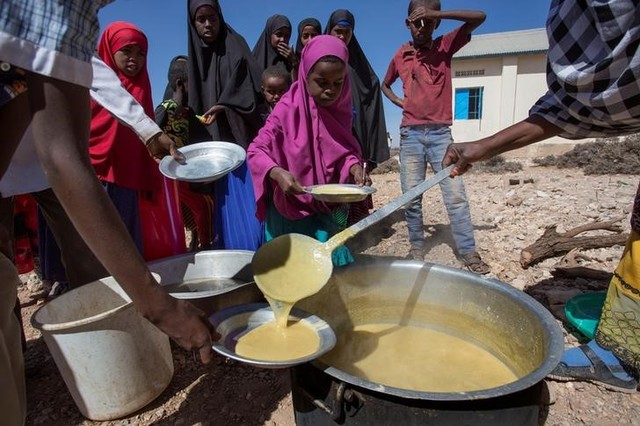Somalia risks famine if aid is pulled out-NRC

As diplomats gather in London for Somalia humanitarian conference tomorrow, the lives of 2.7 million people hang in the balance

By Fauxile Kibet
Foreign donor aid has over the years saved thousands of lives in Somalia over the past years, but with less humanitarian aid, Somalia is now at the brink of being thrown into deeper crisis.
“The international community saved thousands of lives in Somalia last year, and helped stop a famine before it could happen. Norwegian Refugee Council’s (NRC) Regional Director, Nigel Tricks has said. “But less humanitarian aid now threatens to throw the country back into a deeper crisis, even towards catastrophe.
Half a million people today are on the brink of famine, the NRC official noted.
Mr Tricks remarks comes a day before diplomats from governments, donor agencies, the United Nations and other delegates meet in London for a High-Level Event for the Humanitarian Situation in Somalia.
According to NRC, Somalia, which dodged famine last year thanks to international support and robust domestic response, is now undergoing what the United Nations describes as a crisis or emergency phases of hunger.
“With more drought forecast, the humanitarian community seeks USD 1.5 billion for programmes to sustain and rebuild the drought and conflict stricken country.”
An intervention by donors last year helped avert a humanitarian disaster but according to the refugee agency, the situation is more serious with 5.4 million Somalis in need of aid and over 300,000 children under the age of five malnourished.
“Aid works, as humanitarian aid saved countless lives in Somalia last year, but 2018 promises a new year of crisis. Somalia’s forecast includes continued drought for several regions this year. Without a focused effort by government and the international community to maintain support for Somalis at risk, thousands of people may be pushed back over the edge,” warned Tricks.
Besides the drought, conflict and insecurity are major factors of the current crisis. More than 1.1 million people fled their homes due to drought and conflict last year, adding to the one million people who were already displaced within the country from previous years. Beyond Somalia’s borders, an additional one million people live as refugees.
AMISOM WITHDRAWAL
The humanitarian conference on Somalia comes at a time when contributing states of the African Union Mission to Somalia (AMISOM) are deliberating ways to gradually hand over to Somali Security forces.
The debate on Amisom withdrawal seems to have emboldened the Al-Shabaab militant group which has ramped up attacks in both Somalia and Kenya in recent weeks.
Security experts argue that there is need to relook at the decision to cut down AMISOM forces and instead restore peace keeping troops to previous levels so as to facilitate the recovery of territory still under the control of Al-Shabaab.
“There is no doubt that we need to continue sustainability of military operations. We are working with Somali national security forces to ensure that they gradually take up the lion share of the responsibility for security in Somalia,” said Moussa Faki Mahamat, Chairperson African Union Commission told a gathering of Troops Contributing Countries in Kampala Friday.
But despite an escalation of attacks by the terror group, the Somali government insists is on course to take over security responsibilities from AMISOM.
“We need to put together a sound strategy in order to effectively fight against Al Shabab, to defeat them and I believe they are weak,” said Somalia President.Mohamed Farmaajo said during the talks in Kampala.